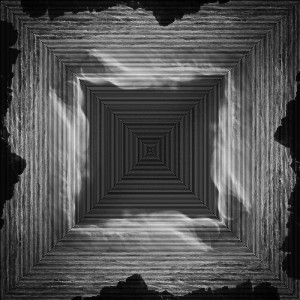The thing about so-called ‘ambient drone’ music is that, after a while, it can all start to sound a bit samey. Indeed, one might say that this is the whole point. On his third album- and vinyl debut, following two limited-run cd-rs- London-based "fringe psychedelicist" Alex Monk addresses this elephant in the womb by revisiting the genre’s earliest ancestors for inspiration- medieval plainsong, modal folk music, and the European classical modernist composers of the early twentieth century. Channelling these sources through a filter of minimalist music, dub, Krautrock and the various innovations of the post-industrial diaspora, The Safety Machine blends free improvisation with considered composition, gently guiding the listener down into the depths of their own mental underworld and, crucially, back out again.
It begins seductively enough, with the opening four minutes of first track, ‘Masks Survive’ resembling a more primitive Six Organs of Admittance, as a flatly strummed acoustic accompanies a half-sung litany or pagan incantation. The wordless female backing vocals are pure Hammer Horror, as is the submerged, church-like organ, and the whole piece is dipped in so much echo that eventually it just drifts apart, dissolving finally into a kind of rustic dub that drifts for five long minutes through otherworldly, oceanic space. It’s a letting go, but one that keeps you on a fish-hook of primal dread, no matter how far the line is played out.
It’s this second half of the song that sets the tone for the rest of the album; indeed, it’s not until midway through ‘Spiders,’ the eighth track, that a menacing electronic dirge shifts into back into a descending minor-key lament for acoustic guitar, the deft finger-picking and weary vocals once again worthy of Ben Chasny or James Blackshaw. There’s a vast amount of sparsely populated sonic territory to cross before then however. Take track three, ‘Much Further out Than You Thought’; a melancholy drone with a fragmented melody played on what sounds like a concertina, flecked with electronic weather. Once again, there’s a sense that this is dub music if born from rainswept Welsh valleys in the early days of the Industrial Revolution.
Fragile, glassy spider webs of sound are strung across the empty spaces of ‘The Oceans You Choose,’ made with what I’m guessing is a treated mandolin, although it could easily be a hammered dulcimer. This sparing use of traditional, even archaic instrumentation alongside studio electronics is one quality that distinguishes The Safety Machine from ostensibly similar collections; another is the strong melodic sensibility that, while subtly deployed, is ever-present, giving the compositions both dynamism and a powerful emotional resonance. ‘Sammy’s Song,’ for instance, is a minimal, but classically constructed organ piece, tightly disciplined and all the more powerful for it. The album’s centrepiece, ‘Cabira’- inspired by Fellini’s 1957 film Nights of Cabira– evokes the atmosphere of medieval plainsong in some retro-futuristic cathedral from a Moebius graphic novel, thanks in large part to the mildly Diamanda Galas-like tones of Italian vocalist Elisa Gallo Rosso, whose astonishing voice drifts over the shifting, sustained electronic drone like the proverbial spirit moving across the waters.
Rosso returns on ‘Crossing,’ a near-demonic presence acting as counterpoint to the rising and receding church organ, a meditative pulse tuned to the rhythm of the tides or the human breath, yet with a scratchy, distorted undertow that favours nagging tension over naïve new age notions of the purity of sound. And if brief interludes like ‘Light Separation’ and ‘I Can Hear You Through The Breeze’ sound like incidental music for some lost children’s TV drama circa 1970, involving supernatural goings-on in the Anglian fens, telepathic aliens manifesting themselves near an ancient burial mound, then ‘Walking with Beatrice’ evokes 1961 Horror classic The Innocents, a supremely spooky adaptation of Henry James’ The Turn of the Screw, its ghostly siren vocals rising to a crescendo of nightmarish eroticism
No such parlour tricks are necessary on ‘Vathek’s slow burn of dark, unsettling ambience: after about eight minutes several crashing chords- the same one- of distorted electric guitar begin building up over the single uncoiling electrical hum, leading to a feral climax that trails off into an eerie, echoing coda. Final track, ‘1000 Ships to the Next Life’ finds deep male choral vocals fading in and out over a rising organ note until eventually a high, unearthly keening descends from the heavens, the voices joining in a desolate threnody of mourning and mystery.
Singularly appropriate to the long, cold nights and grey daylight hours of January, The Safety Machine acts as an ominous overture to what promises to be one heavy motherfucker of a year.


